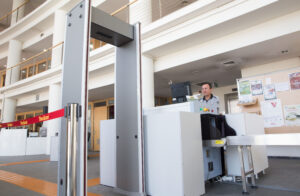Guard Tour Monitoring Systems
Guard Tour control systems play a central role in security and patrolling. Over time, these systems have evolved to include various technologies such as Touch, RFID and now, NFC, QR Codes and GPS, to ensure accurate tour reporting. This blog will explore the definition and evolution of Guard tour control systems, as well as the question of whether modern Guard tour control systems, despite their technological advancements, are a substantial upgrade over their older counterparts.
Defining Guard’s Tour Control System
A Guard’s Tour Control System is a security tool that monitors guard patrols. It is designed to ensure that security personnel follow predefined routes and visit specific checkpoints at scheduled intervals. Rather than relying on manual record-keeping, these systems employ diverse technologies to ease the process.
Evolution of Guard’s Tour Systems
Touch Technology Era
In the early stages, Guard’s Tour Systems relied on touch technology. Guards used a handheld device to physically touch designated checkpoints, recording their presence. This technology can be found in the SMARTPEN, Guards tour System of Polimek Electronics.
RFID Advancements
With technological advancements came Radio-Frequency Identification (RFID) technology, offering a more efficient approach. RFID tags placed at checkpoints can be read without contact, reducing the overall touring time. Polimek Electronics 1st Manufacturer of Guards Patrol System is offering Their PoxiPen with RFID Technology.
NFC for Real-time Data
Near-field Communication (NFC) took this evolution a step further, enabling real-time data transmission between the checkpoints and the control center. This technology ensures immediate updates and enhances response times.
QR-Codes and GPS Integration
The introduction of QR codes and GPS has further expanded the capabilities of Guard’s Tour Systems. QR codes allow for quick and easy checkpoint scanning, while GPS provides accurate location tracking for patrols.
Old vs. Now: A Comparative Analysis
Modern technologies impact many aspects of security and patrol systems. However, it is essential to examine whether adopting newer technologies actually represents a superior choice for users.
1. Simplicity and Low-Tech:
Older guard tour control systems are simple to use and easy to maintain. This reduces the risk of mishandling compared to GPS, which can be too complex when poorly implemented.
2. Cost-Effectiveness:
Older systems are often more economical over time due to their durability and resistance to obsolescence. Newer technologies undergo frequent changes and updates, which can become more expensive in the long run.
3.Immunity to Hacking:
Traditional systems do not have digital vulnerabilities, making remote manipulation impossible. On the other hand, systems such as QR-Code can be easily copied and GPS, when connected to a network, can be infiltrated and tampered with, posing a significant security threat.
Conclusion
The evolution of the Guard’s tour control systems reflects the constant advancement of technology and its impact on the security industry. Although modern systems offer exciting features such as real-time data transmission and precise location tracking, they come with their own set of challenges, including complexity, costs, and digital vulnerabilities. The challenges that these systems may encounter are not inherent to the technology they embed but mainly depend on the way in which manufacturers implement these technologies to make them simple, safe, and accessible. We can therefore take away that the choice between older, proven systems and newer, technologically advanced systems ultimately depends on the specific security needs and priorities of the implementing organization.






